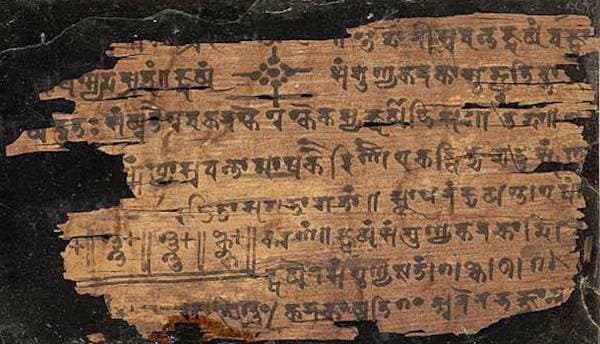Algebra
Claim: Muslims gave the world Algebra
Source: https://twitter.com/QasimRashid/status/1342457710386819077
Fact: Indians had Algebra before the Muslim prophet & religion were even born. Here is Bakhshali Manuscript dating back to the 3rd century CE. It is an Algebraic treatise. The Bakhshali manuscript, which has been carbon-dated to the 3rd century CE, is an ancient Hindu treatise on Arithmetic and Algebra. The Algebraic problems deal with simultaneous equations, quadratic equations, arithmetic, geometric progressions & quadratic indeterminate equations.

Bakhshali isn’t the earliest Indian Algebraic treatise. Early Algebra is found in Shulba Sutras dating back to at least 800 BC. Traditional Algebra reached its pinnacle in the works of Aryabhata & Bhaskara. What makes Bakhshali special is it offers mathematical proof to its theories. It also contains the oldest known record of zero
The earliest work of “Arabic Algebra” is the “Al-Kitāb Al-Jabr wal-muqābala” by Al Khwarizmi. The term “Algebra” comes from this book (“Al Jabr”). Before writing his treatise, Al Khwarizmi visited India. His book is plagiarism from Indian Mathematics and an obvious one at that.
For example, compare the derivation of PI given in his book Algebra by Khawarizmi (which he ascribes to “astronomers”) to that given by Aryabhata 300 years before his time.
Aryabhata

Khwarizmi

Not just the value but even the terminology used is identical.
The fact that Khawarizmi heavily plagiarised from Indian Mathematicians has been known to western scholars for 200 years. Henry Thomas Colebrooke was a historian and Mathematicians. Writing in 1817, Colebrook came to the conclusion (page 4) that Khwarizmi owed his Algebra to Hindus. After carefully examining the works of Khawarizmi and ancient Hindu mathematical texts, Colebrooke concludes: “The inevitable conclusion is that Khawarizmi, being conversant with the sciences of Hindus, must have learned Algebra from Hindus”.
Another European Mathematician, Pietro Cossali also came to the same conclusion after diligent research. He says: “Khwarizmi was skilled in Indian tongue and fond of Indian matters. He translated Indian works. He was the first instructor of Muslims in Algebra. Not having taken Algebra from Greeks, Khwarizmi must have either invented it himself or taken it from Indians. Of the two, the second appears to me, the most probable”
Source: https://twitter.com/BharadwajSpeaks/status/1343142908224917505
In a more recent work, Starr Fredrick provides further insights -
- Khawarizmi had deep interest in Indian science and math.
- Indian culture exerted a powerful influence in Khwarizm.
- Hinduism exerted influence on Khwarizmian calendar.
The Arabs were invading nomadic armies from Arabian deserts. They lacked most basic education and literacy. Even after conquests, Arabs were living in tents. What made them them take any interest in Indian Mathematics? What made Khwarizmi write his work? Who civilized illiterate desert nomads? Answers are below.
Until 770, which is almost 140 years AFTER the prophet, there was not a single Arabic work on science. Not one Arabic work on Math. Not one Arabic work on Medicine. Absolutely nothing. There is no exception to this rule. Until 770, Arabs produced only religious works or simple poetry. There is no exception to this rule.
Even after Islamic conquests, most 7th century Arabs lived in tents. Even the emperor of Arabs, their Caliph Muawiya, lived a very small shack constructed of only brick and timber. He did not have a proper roof and there were birds all over his ‘ceiling’. This person was not just a desert chief but an emperor who conquered everything from Constantinople until Afghanistan. Needless to say, there was no knowledge of Algebra among these people.
Further, there is no religious significance of 786 mentioned in Quran or Hadith. This is just local belief of Indian origin Muslims.
Claim: Muslims were familiar with the concept of a thousand before the 8th century. The concept of large numbers, including a thousand, was well understood in the ancient world, including in the regions that became part of the Islamic empire.
Fact: According to professor Stephen Shoemaker, “thousand” (alf) was a descriptive rather than any number in early Arabic.